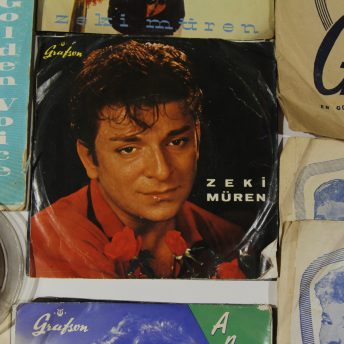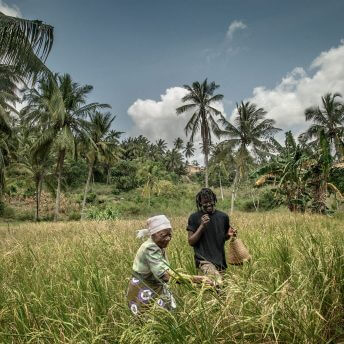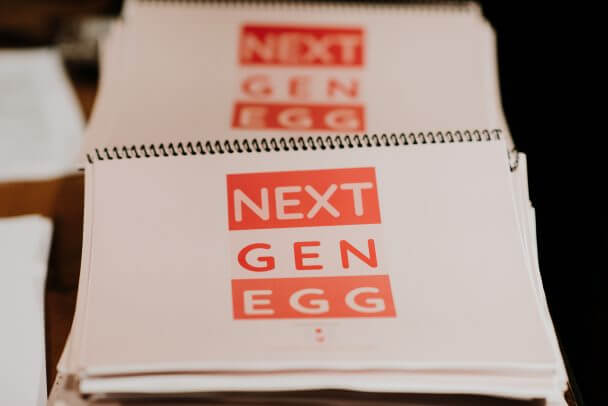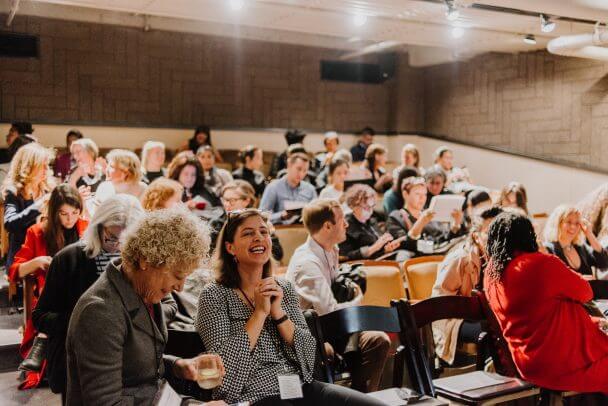Don’t miss the (Egg)celerator Lab Pitch at Sheffield Doc/Fest!
Sheffield Doc/Fest kicks off today, Thursday, June 6 and continues into Tuesday, June 11. The world-leading festival celebrates the art of documentary with over 180 screenings of nonfiction films, as well as the business of the film industry, with a packed slate of pitches, funding opportunities, and meetings as part of the Sheffield Doc/Fest Marketplace and MeetMarket.
This year, Chicken & Egg Pictures is proud to present our third annual (Egg)celerator Lab pitch, in which filmmaking teams from all ten 2019 (Egg)celerator Lab grantees give quick pitches to a live audience of documentary industry folks and receive feedback from international decision makers and buyers.
This year’s pitch session is moderated by award-winning filmmaker Judith Helfand, Chicken & Egg Pictures’ Co-Founder and Senior Creative Consultant, and will include a panel of:
- José Rodriguez of Tribeca Film Institute,
- Alexandra Hannibal of CNN Films,
- Jo Lapping of BBC Storyville,
- Jess Gormley of The Guardian, and
- Christine Kecher of A&E Networks.
The 2019 (Egg)celerator Lab grantees are:
- An Act of Worship, directed by Nausheen Dadabhoy (US/PAKISTAN)
- #Mickey, directed by Betzabé García (MEXICO)
- Between Fire and Water, directed by Viviana Gómez Echeverry (COLOMBIA)
- We Are Inside, directed by Farah Kassem (LEBANON)
- Untitled PRC Project, directed by Jessica Kingdon (US)
- Mama Bears, directed by Daresha Kyi (US)
- Silent Beauty, directed by Jasmin López (MEXICO/US)
- Pray Away, directed by Kristine Stolakis (US)
- Cutting Through Rocks, co-directed by Sara Khaki and Mohammad Reza Eyni (IRAN/US)
Anyone with a Sheffield Doc/Fest pass is welcome to sit in on the sessions, learn about the incredible film projects these emerging filmmakers are working on, and hear feedback from panelists. The Chicken & Egg Pictures (Egg)celerator Lab Pitch will take place Sunday, June 9 at 11:00 AM at ITV Town Hall Reception Room B. More information here.
And if you’re at Sheffield Doc/Fest, don’t miss screenings of these Nest-supported films:
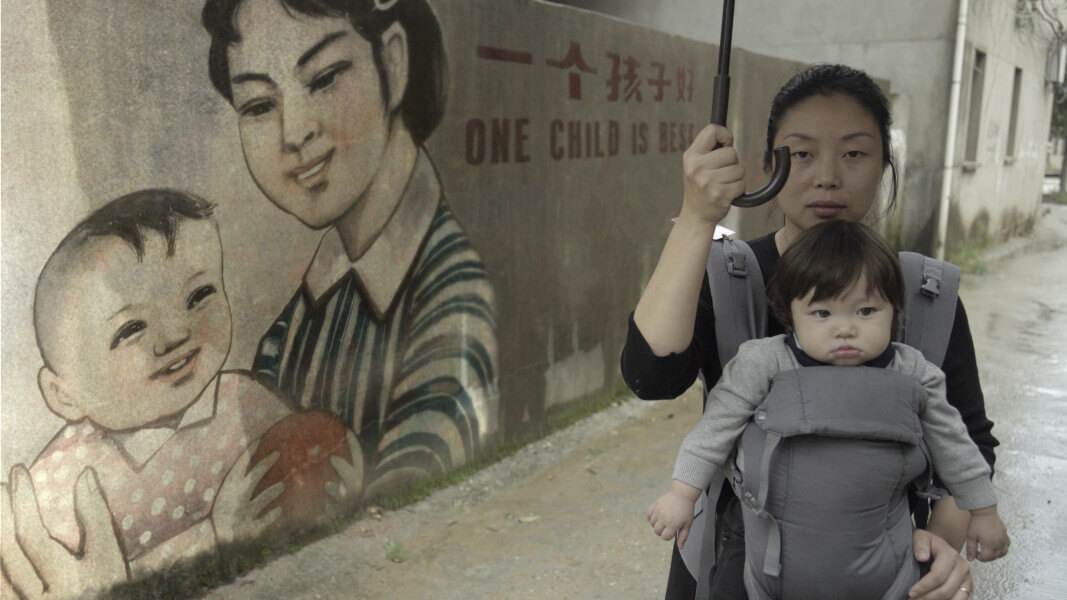
One Child Nation (2017 (Egg)celerator Lab grantee), directed by Nanfu Wang (also a 2018 Chicken & Egg Award recipient) and Jialing Zhang
How much control does a person have over their own life? In China, state control begins before a child is even born.
One Child Nation is in the running for the The Tim Hetherington Award, supported by Dogwoof. Tickets and screening times are available here.
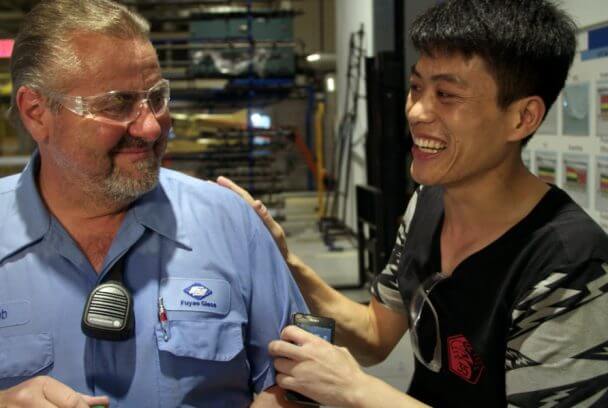 American Factory, directed by Julia Reichert (2016 Chicken & Egg Award recipient) and Steve Bognar*
American Factory, directed by Julia Reichert (2016 Chicken & Egg Award recipient) and Steve Bognar*
Dizzying, hilarious and devastating, this tale of two factories makes for a landmark story of workplace anxiety. Directors Reichert and Bognar have spent a decade documenting the plight of Ohio’s factory workers, and their dedication pays off when they are given astonishing access to Fuyao, a Chinese auto glass manufacturer, as it revives a shuttered General Motors plant in Dayton.
Tickets and screening times are available here.
Hail Satan?, directed by Penny Lane (2017 Chicken & Egg Award recipient)
With humor and searing insight, director Penny Lane debunks misrepresentations about the Satanic Temple. Drawing on extensive access to the organization’s participants, this unflinching examination reveals the controversial religious movement’s aim to shine a light on the hypocrisy around America’s separation of church and state.*
Tickets and screening times are available here.
And a special shoutout to these members of our AlumNest of previously-supported filmmakers: Knock Down the House, directed by Rachel Lears (former Nest grantee for The Hand That Feeds) and The Great Hack, directed by Karim Amer and Jehane Noujaim (former Nest grantee for The Square).
Announcing our Newest Eggsperts
We’re thrilled to announce the two newest additions to our team of Eggsperts! Eggsperts participate informally as friends and allies, helping to conceptualize our future course and promoting our growth, visibility, and impact for the long-term.
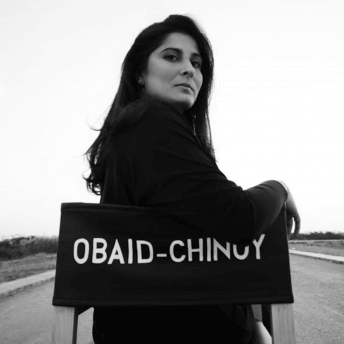 Sharmeen Obaid-Chinoy is the only female director to have been awarded two Academy Awards by the age of 37. Since 2001, she has made over two dozen multi-award winning films in over sixteen countries around the world. Her films include Student Athlete, A Girl in the River: The Price of Forgiveness, Song of Lahore, Saving Face, A Journey of a Thousand Miles: Peacekeepers and Transgenders: Pakistan’s Open Secret.
Sharmeen Obaid-Chinoy is the only female director to have been awarded two Academy Awards by the age of 37. Since 2001, she has made over two dozen multi-award winning films in over sixteen countries around the world. Her films include Student Athlete, A Girl in the River: The Price of Forgiveness, Song of Lahore, Saving Face, A Journey of a Thousand Miles: Peacekeepers and Transgenders: Pakistan’s Open Secret.
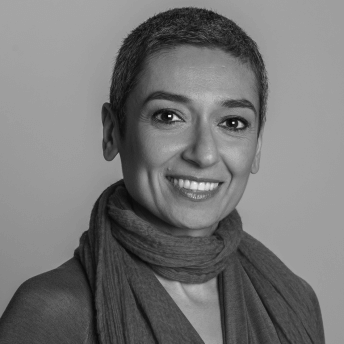 Zainab Salbi has frequently been named as one of the women changing the world by leading publications, from People Magazine to Newsweek. At the age of twenty-three, Zainab founded Women for Women International, a humanitarian organization dedicated to women survivors of wars. Under her leadership (1993–2011), Women for Women International grew from helping 30 women upon its inception to helping more than 420,000 women and distributing more than $100 million in aid.
Zainab Salbi has frequently been named as one of the women changing the world by leading publications, from People Magazine to Newsweek. At the age of twenty-three, Zainab founded Women for Women International, a humanitarian organization dedicated to women survivors of wars. Under her leadership (1993–2011), Women for Women International grew from helping 30 women upon its inception to helping more than 420,000 women and distributing more than $100 million in aid.
To find out more about our new Eggsperts, read Sharmeen Obaid-Chinoy’s profile in The New Yorker, “An Activist Filmmaker Tackles Patriarchy in Pakistan”, or watch Zainab Salbi’s TED Talk about the women who keep everyday life going during conflicts.
Post by 2018 Communications Intern Morgan Lee Hulquist.
Our Newest 2018 Diversity Fellows Initiative Grantee
We are very excited to welcome director Nausheen Dadabhoy and her second feature-length documentary An Act of Worship to the 2018 Diversity Fellows Initiative.
An Act of Worship follows young Muslim women beginning their career in activism at a time when hate crimes against Muslims have reached their highest level since 9/11. The travel ban has sent the message that Muslims are not welcome in the US. Now, a new generation has been galvanized into action to reclaim their space in the American landscape.
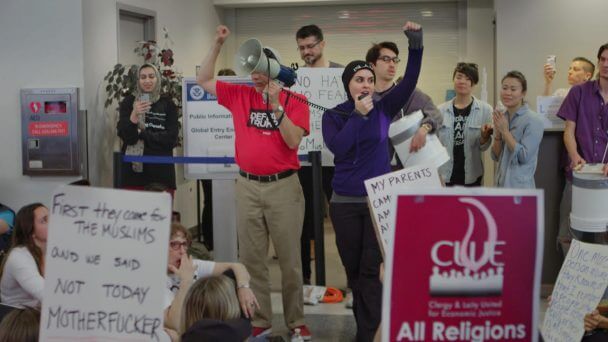
Nausheen Dadabhoy is a Muslim American director and DP who has always moved seamlessly between the narrative and documentary world. Her latest documentary J’adore Nawal premiered at Sundance, while her last narrative film La Femme et le TGV (The Railroad Lady) was a live action short Oscar nominee. Her directorial debut, The Ground Beneath Their Feet premiered at IDFA. Nausheen has been a Film Independent Project:Involve Fellow, a Berlin Talents participant, and is a current Firelight Fellow.
The 2018 Diversity Fellows Initiative cohort is soon to embark on a week-long storytelling retreat in upstate New York aimed to help develop and strengthen their film’s narratives. As part of the retreat, the grantees will be participating in skill-sharing workshops where they will learn from one another’s unique perspectives and artistic practices.
Other participants of the 2018 Diversity Fellows Initiative include:
The In Between, directed by Robie Flores; Commuted, directed by Nailah Jefferson; A Prince From Outer Space: Zeki Müren, directed by Beyza Boyacioglu; and The Letter, directed by Maia von Lekow & Chris King.
The Diversity Fellows Initiative is made possible with the generous support of The Harnisch Foundation, the MacArthur Foundation, and the Time Warner Foundation.
Post by 2018 Communications Intern Morgan Lee Hulquist.
Chicken & Egg Accelerator Lab Live Pitch at Sheffield Doc/Fest
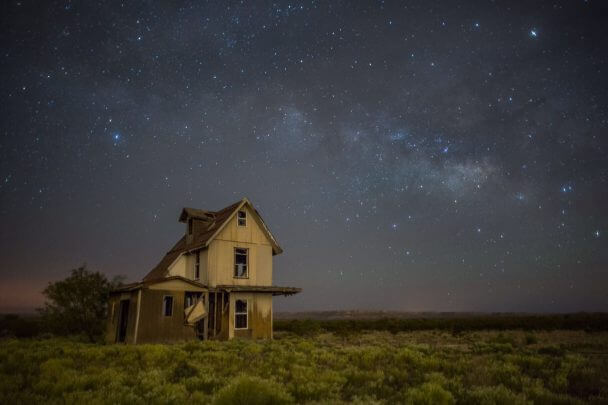
Join us for our first ever LIVE CHICK-PITCH at the 2017 Sheffield Doc/Fest.
Our focus: to showcase, celebrate, and introduce you to the work, vision, and promise of 10 compelling projects helmed by emerging women directors from around the globe—each one a member of our 2017 CHICKEN & EGG PICTURES Accelerator Lab, hailing from Bangladesh, China, Somalia, Mexico, Poland, and across the US.
The Live Pitch will take place on Sunday, June 11, 12:00 – 14:00 pm at the Sheffield ITV Town Hall Reception Room B.
Moderated by award-winning filmmaker Judith Helfand, Chicken & Egg Pictures’ Co-Founder and Senior Creative Consultant.
THE PROJECTS
- Born in China by Nanfu Wang & Lynn Zhang (China)
- The Guardian of Memory by Marcela Arteaga (Mexico)
- Kids Can Spit by Chelsi Bullard (US)
- Lights, Camera, Uganda by Cathryne Czubek & Hugo Perez (US)
- People I Know by Zofia Pregowska (Poland)
- Rajada Dalka/Nation’s Hope by Hana Mire (Somalia)
- The Rashomon Effect by Lyric R. Cabral (US)
- Surf Girls of Cox’s Bazar by Elizabeth D. Costa (Bangladesh)
- The Surrender of Waymond Hall by Jane Greenberg, (US)
- Unaccompanied Children by Alexandra Codina (US)
Find out more about the 2017 Accelerator Lab.
If you would like to attend let us know by emailing Sabine Fayoux, Program Coordinator, at sabine@chickeneggpics.org.
If you can’t join us at the Live Pitch please consider meeting with the filmmakers individually or in small group meetings during the festival. To coordinate a meeting, please contact our European representative and Sheffield Doc/Fest liaison Tereza Šimíková at simikova.tereza@gmail.com.
The Chicken & Egg Pictures Accelerator Lab is a year-long program that brings together 10 nonfiction projects directed by women from around the world who are making their first or second film. The program provides them with a major grant of $35,000 USD and intensive mentorship that strives to balance creative storytelling and core producing skills with practical models for building sustainability, community, and relationships in the nonfiction marketplace. The 2017 Sheffield Doc/Fest marks the program’s second of three retreats, this one built around utilizing and leveraging all that the Sheffield Doc/Fest’s Meet Market and Industry Convenings have to offer.
Chicken & Egg Pictures Partners with Magnet Media to Explore Emerging Platforms in Storytelling
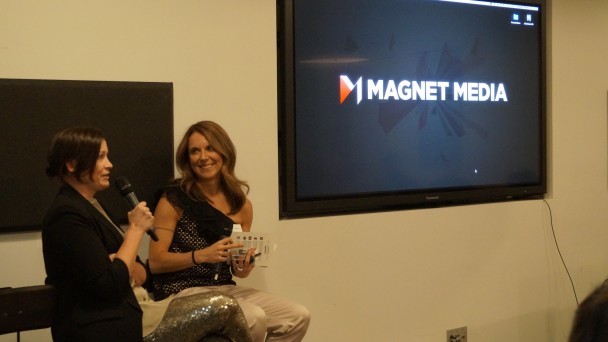 New approaches to storytelling continue to expand as new technology emerges and accessibility to platforms improves. While the basic act of crafting compelling stories remains unchanged, transmedia and emerging storytelling platform challenge the ways storytellers produce these stories and change the ways audiences can experience them.
New approaches to storytelling continue to expand as new technology emerges and accessibility to platforms improves. While the basic act of crafting compelling stories remains unchanged, transmedia and emerging storytelling platform challenge the ways storytellers produce these stories and change the ways audiences can experience them.
Chicken & Egg Pictures partnered with Magnet Media to co-host the “VIP Roundtable: Social Video, Interactive Video & Emerging Platforms” event in order to achieve greater understanding of the influence the audience has on the storyteller in this digital era. On a Thursday night on April 13th, media makers and shakers, marketers, and filmmakers convened for an evening of dialogue, engagement, and reflection about what the future of storytelling holds for content creators and distributors. Panelists included experts from Twitch, Cheddar, Refinery29, Google Fiber, and RAPT Media, and provided insights and steered conversations on innovative storytelling: from the growth of live streaming and its impact on how we consume daily news, to leveraging the power of interactive video in the business sector to strengthen brand engagement with consumers.
As part of our Alumni Resource and Support Network, Chicken & Egg Pictures partnered with Magnet Media to provide our filmmakers with the opportunity to connect with other creatives and media professionals, learn new forms of storytelling, and discover potential opportunities as storytellers in the field. “The event demonstrated Magnet Media and Megan Cunningham’s commitment to creating a more inclusive industry through networking, tailored education, and unique access,” said Yvonne Welbon, Chicken & Egg Pictures Senior Creative Consultant.
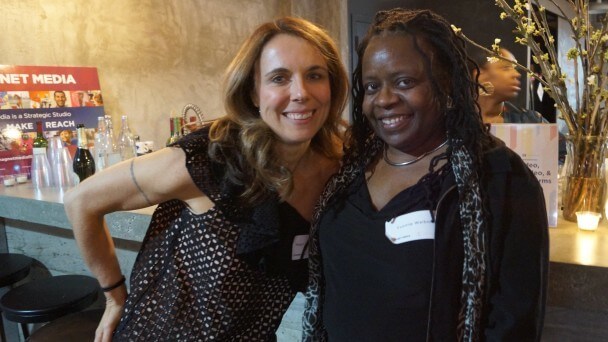 We may not know what new emerging platforms will take form in the coming months or years (technology is rapidly evolving!), but we know one thing is for certain: the future of storytelling is immersive.
We may not know what new emerging platforms will take form in the coming months or years (technology is rapidly evolving!), but we know one thing is for certain: the future of storytelling is immersive.
Post by Netsanet Negussie, Spring 2017 Chicken & Egg Pictures Program Intern
Program Manager Iyabo Boyd shares some last-minute tips for our 2015 Accelerator Lab Open Call
The deadline for the 2015 Accelerator Lab Open Call is fast approaching. Applications are due this Wednesday, June 10, 2015, by 5:00 PM EDT.
If you’re only just getting started on your application, don’t worry – we’ve compiled the below tips to help you get up to speed fast:
Overview: For those of you that want a full breakdown of this whole process, please review our Grants page and Frequently Asked Questions, both of which provide very helpful and thorough information. If you still have questions, please email info@chickeneggpics.org with your project title in the subject line.
Funding and mentorship: This Open Call for funding is the process that determines which films will be selected for our 2015 Accelerator Lab. If you are selected to receive a grant, you will also participate in the lab, which is a year long intensive mentorship program (with possibility for extension). It is not a goal of the lab for the films to be completed in that year; that is the length of time you’ll spend with us receiving mentorship. The lab will be structured around 3 to 4 retreats that the granted directors are required to attend, with travel support from us. The lab will be more intensive and tailored than our past mentorship programs, but if you want some insight on our mentorship style in general, take a look at our mentorship page or our blog.
First- or second- time filmmakers: When we say first- or second- time filmmaker, we’re talking specifically about your experience as a director or co-director of feature-length documentaries. You are still eligible if you’ve already made a few shorts, or done fiction work, we’re looking for directors who are making their first or second feature-length documentary. By feature length, we mean 40 minutes or more. Read more about this in our Frequently Asked Questions.
Early production: For this round, we’re only accepting projects between development and early-production (with no more than 40% of the footage shot) because we want to ensure that we have the greatest opportunity possible to make an impact on the film and on your development as the director. If you’re having trouble figuring out what percentage you’ve shot, think about the big picture of your finished film, where you are now, and what you need to do to get to that finished project. What do you have in the can, and how much more shooting do you think you have left to do? That’s how you’ll assess if you’ve reached the 40%. We’re not keeping count, but we hope you’ll respect the guidelines and be honest with yourself when considering applying.
Work samples: In a nutshell, the short work sample should grab our attention and show the project’s potential; the long work sample should give us a deeper sense of your directorial style, characters, and pacing of the film; and the prior work sample should tell us about your experience and your ability to follow through. The short and long samples should consist of pieces of the project with which you’re currently applying, whereas the prior work sample is from a different film you’ve worked on in the past.
No footage shot yet: We have a strict requirement of at least 7 minutes of footage for applicants. If you can, shoot something quickly before the deadline or maybe ask your subjects to shoot some verite or interview of themselves for you, but only if you think it will be good enough to represent your project in our review process. We do not accept unsolicited updates, so the application is the only opportunity for you to show us what you have. If it doesn’t seem you can get it all together before the deadline, it might not be the right time for you to apply for this round.
Parting shots: Here are a few last items to keep in mind:
-
- For this round we are not accepting interactive projects or series. Stay tuned for announcements on an upcoming program geared toward these formats in 2016. Join our mailing list, and follow us on Facebook and Twitter.
- If you’re unsure what makes a documentary a hybrid, check out this great article from the POV blog. Please also note that just because your film is based on a true story, that doesn’t mean it’s automatically a hybrid.
- For guidance on the written application, be sure to look at the help text on the right side of each question. Please also note that the word count for many of the essay based questions is 2300 characters, including spaces. Trust us, brief is better.
If you have any additional questions or concerns, send an email to info@chickeneggpics.org. Be sure to include the name of your project in the subject line.
Acing Your Q&A
Filmmaker discussions and Q&As are a great way for you to connect with the people who care about your film, and audiences love the chance to engage with you and discuss your film.
Glenn Raucher, Director of Theater Operations at the Film Society of Lincoln Center has seen countless film talkbacks; below, he and his staff shared with us stories of Q&A pros who used every possible chance to connect with their audience.
“John Waters, upon hearing that we were turning away 100+ people (!) from a stand-by line (sure to be disappointed, at best), offered to go out and greet them all, giving them a great experience, despite being turned away. Pedro Almodovar did the same before his ridiculously sold-out Amphitheater Talk” – Glenn Raucher, Director of Theater Operations.
“In 2002 Gary Sherman brought in his own print of “Deathline,” (uncut and very different from the theatrically released 1974 version that was re-titled “Raw Meat”). As a result, the audience got to see a version of the movie that had rarely, if ever, been shown in the United States. He was also patient and cooperative with the staff and his fans.” -Fletch Cossa, House Manager
“During a screening of “Jauja” in the New York Film Festival, the subtitling for the film failed momentarily, causing us to have to pause the film. Viggo Mortensen stood up, and cheerfully talked with the crowd while they waited, also communicating that…s**t happens, and it’s all good! It diffused the tension until the computer issue was fixed and the film resumed.” -Glenn Raucher, Director of Theater Operations
“Sacha Baron Cohen, in character as Borat, offered a “Brazilian” to everyone taking an elevator backstage with him, including our house manager. He was also, out of character, unfailingly friendly and polite.” -Karim Allick, House Manager
“A woman approached me and asked if I could help her convince Jean Dujardin to record a brief message of uplift for her very sick husband, a friend of the Film Society’s. Dujardin had flown in that day, and was clearly exhausted, but after a brief explanation, he said “of course!” and recorded a charming and funny get-well message.”- Glenn Raucher, Director of Theater Operations
These stories remind us that you don’t have to be a celebrity to make a great impression on your audience. House Manager Patrick Ng shares 3 overall tips to keep in mind for your Q&A:
- Keep your answers brief, unless you have an awesome anecdote to tell. This allows for more questions to be taken from the audience, and keeps the momentum moving. First time filmmakers tend to be more long winded in their responses, while the pros take the “less is more” approach. Short answers also provide the best quotes used in press and social media.
- Share your insight. People will remember your Q&A more when they can walk away with a nugget of insight that will inspire them, motivate them, make them look at something in a different way.
- Schedule permitting, make yourself available after the Q&A (in the lobby, not the theater!) to take more questions. A lot of people don’t feel comfortable asking a question in front of a full house and would prefer a more intimate circumstance.
Mentorship Selects: How to follow up
Programmers and executives from HBO, Candescent Films, POV, and IFP shared their favorite ways filmmakers follow up:
Re-introduce yourself and your project.
Send a short email with where we met and a one page sheet with all the info about your film.
If you send a link, make sure it’s downloadable and easily accessible.
If it can’t be downloaded for security reasons, explain and ask how many DVDs you should send. Make sure your link has a very easy password so people don’t get frustrated opening it.
Know when to give them some space.
Send another quick email if you don’t hear back but back away after 3 follow-up emails.
Be nice.
If you see the programmer or executive, be friendly. Don’t tell them they didn’t respond or remember you. If they can’t help you personally, they still can be a friend to the project by connecting you with other people who can help you, so keep the lines of communication open and courteous.
Mentorship Selects: How to give confident and compelling interviews
Many filmmakers prefer working behind the camera, not in front of it, but talking about your film on TV, radio, and on panels provides enormous exposure for your film and the issues it tackles. Filmmaker Jessica Devaney and publicist Adam Segal of The 2050 Group joined our New York mentorship to shed some light on media presentations and dispel some common fears around media interviews.
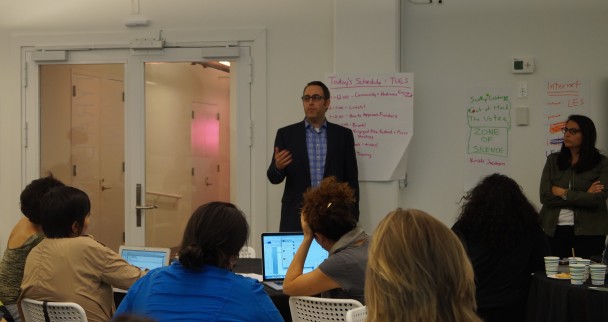
Here are their tips for giving your best media interviews:
Tell the story you want to tell.
Remember: as a filmmaker you are a storyteller, not a pundit. In media scenarios you are in charge of the story you present and you can direct the conversation toward what you want people to know about your film. Don’t just answer the questions. Ask yourself: what sentence do I need to say for this to be successful? Make sure you don’t get up till you say that sentence.
Be accessible.
Avoid jargon or overly technical vocabulary; don’t alienate your audience with big words or phrases they might not understand. Neutralize distracting physical tics like touching your hair or fiddling with jewelry.
Do your homework.
Talk to the producer and find out what they’re going to ask you. Look up when they last interviewed someone like you or talked with someone on your topic (via tracie). Observe what kinds of questions they asked or what angle they took.
Keep a cool head.
If you are a person who gets worked up, practice talking about hot button issues without losing your cool. If you make a mistake or say some wrong information, correct it before someone else does.
There’s strength in numbers.
If you want to take the focus off yourself, bring one of your subjects in the film with you.
Make sure your assets and materials are versatile.
Put together clips and assets that can be reused in different settings or shared in a different context.




